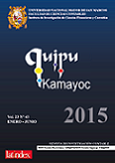REFUND OF THE FONAVI CONTRIBUTIONS, ANOTHER PUBLIC DEBT FORGOTTEN BY THE PERUVIAN GOVERNMENT
DOI:
https://doi.org/10.15381/quipu.v23i43.11608Keywords:
Contributions to FONAVI, percentages of contributions to FONAVI, Law 29625, updating of contributions to FONAVI, fonavistasAbstract
The purpose of the National Housing Fund (FO-NAVI) was to facilitate access to home ownership to contributing workers, denatured mismanagement of successive governments and allocation of resources to works of electrification, water and sewer for urban shantytowns, motivated the law No. 29625 passed by referendum, so that the FONAVI law refunds money to the workers who contributed to it. The problem is complex; here we address only an edge: the liquidation of contributions to FONAVI, with paycheck stubs and updates, using the accumulated factors of legal interest rates. The results are reasonable amounts on average, much higher than what was ordered by the Ministry of Economy and Finance, in contravention of Law 29625. However, the amounts updated with the legal interest rate of workers retired in 1990 or in previous years, would be lower than simple dollarization with the exchange rates of the dates on which the discounts were made.
Downloads
Downloads
Published
Issue
Section
License
Copyright (c) 2015 Esteban Marino Avelino Sánchez

This work is licensed under a Creative Commons Attribution-NonCommercial-ShareAlike 4.0 International License.
AUTHORS RETAIN THEIR RIGHTS:
a. Authors retain their trade mark rights and patent, and also on any process or procedure described in the article.
b. Authors retain their right to share, copy, distribute, perform and publicly communicate their article (eg, to place their article in an institutional repository or publish it in a book), with an acknowledgment of its initial publication in Quipukamayoc .
c. Authors retain theirs right to make a subsequent publication of their work, to use the article or any part thereof (eg a compilation of his papers, lecture notes, thesis, or a book), always indicating the source of publication (the originator of the work, journal, volume, number and date).





























